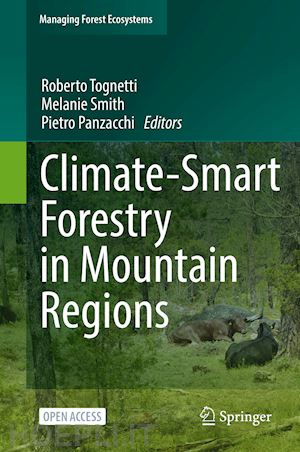
Questo prodotto usufruisce delle SPEDIZIONI GRATIS
selezionando l'opzione Corriere Veloce in fase di ordine.
Pagabile anche con Carta della cultura giovani e del merito, 18App Bonus Cultura e Carta del Docente
This open access book offers a cross-sectoral reference for both managers and scientists interested in climate-smart forestry, focusing on mountain regions. It provides a comprehensive analysis on forest issues, facilitating the implementation of climate objectives. This book includes structured summaries of each chapter.
Funded by the EU’s Horizon 2020 programme, CLIMO has brought together scientists and experts in continental and regional focus assessments through a cross-sectoral approach, facilitating the implementation of climate objectives. CLIMO has provided scientific analysis on issues including criteria and indicators, growth dynamics, management prescriptions, long-term perspectives, monitoring technologies, economic impacts, and governance tools.
Chapter 1. An Introduction to Climate-Smart Forestry in mountain regions.- Chapter 2. Defining climate-smart forestry.- Chapter 3. Assessment of indicators for climate smart management in mountain forests.- Chapter 4. National Forest Inventory data to evaluate Climate-Smart Forestry.- Chapter 5. Efficacy of trans-geographic observational network design for revelation of growth pattern in mountain forests across Europe.- Chapter 6. Changes of tree and stand growth. Review and implications.- Chapter 7. Modelling future growth of mountain forests under changing environments.- Chapter 8. Climate-smart silviculture in mountain regions.- Chapter 9. Smart harvest operations and timber processing for improved forest management.- Chapter 10. Continuous monitoring of tree responses to climate change for smart forestry – a cybernetic web of trees.- Chapter 11. Remote sensing technologies for assessing climate-smart criteria in mountain forests.- Chapter 12. Economic and social perspective of Climate-smart Forestry: incentives for behavioral change to climate-smart practices in the long-term.- Chapter 13. Assessing the economic impacts of climate change on mountain forests: a literature review.- Chapter 14. Review of policy instruments for climate-smart mountain forestry.- Chapter 15. The role of forests in climate change mitigation: the EU context.- Chapter 16. Smartforests Canada – A network of monitoring plots for forest management under environmental change.- Chapter 17. Climate-Smart Forestry in Brazil.
Pietro Panzacchi got his master’s in Forestry at University of Firenze (Italy) and a PhD in Forest Ecology at University of Bologna (Italy). He currently works at the Center for Inland Areas and Apennines (ARIA) of University of Molise (Italy) where he acted as Project Manager of the Cost Action CLIMO. His research focusses on the effect of Climate Change in forests biogeochemical cycles, with special interests for Carbon and Nitrogen cycling. Atmospheric nitrogen deposition, climate change and carbon stock potential of forests are strictly interwoven and their study at field level is challenging. In the last ten years his collaboration between University of Bologna (Italy), Free University of Bolzano/Bozen (Italy) and University of Molise (Italy) put him in the privilege position to study the effect of different drivers on different environments, from fruit orchards and poplar plantations in the Po plain (Italy), to miscanthus plantations in UK, to Alpine forest in South Tyrol. He started his collaboration with Roberto Tognetti while working for the EFI’s Project Centre on Mountain Forests (MOUNTFOR) when he firstly approached the concept of Climate Smart Forestry.
Melanie Smith graduated with her undergraduate joint honours degree in Biology and Geography from Royal Holloway, University of London. She completed a PhD in palaeoecology and woodland history with London University and Historic Scotland, investigating the interactions through the Holocene between people and their environment in northern Scotland. Currently she is Assistant Principal Academic and Research with Inverness College, University of the Highlands and Islands (Scotland) where she has worked since 2003, primarily leading the development and delivery of research and innovation. Throughout her career of nearly 30 years, she has led research projects and teaching in ecology and conservation, landscape ecology, forest history, and catchment management. Her research in application of palaeoecological data to forest and conservation management, led her to investigate further how an identification and understanding of forest functional traits over long time frames can inform the management of forests as complex adaptive systems for climate-smart forestry.











Il sito utilizza cookie ed altri strumenti di tracciamento che raccolgono informazioni dal dispositivo dell’utente. Oltre ai cookie tecnici ed analitici aggregati, strettamente necessari per il funzionamento di questo sito web, previo consenso dell’utente possono essere installati cookie di profilazione e marketing e cookie dei social media. Cliccando su “Accetto tutti i cookie” saranno attivate tutte le categorie di cookie. Per accettare solo deterninate categorie di cookie, cliccare invece su “Impostazioni cookie”. Chiudendo il banner o continuando a navigare saranno installati solo cookie tecnici. Per maggiori dettagli, consultare la Cookie Policy.